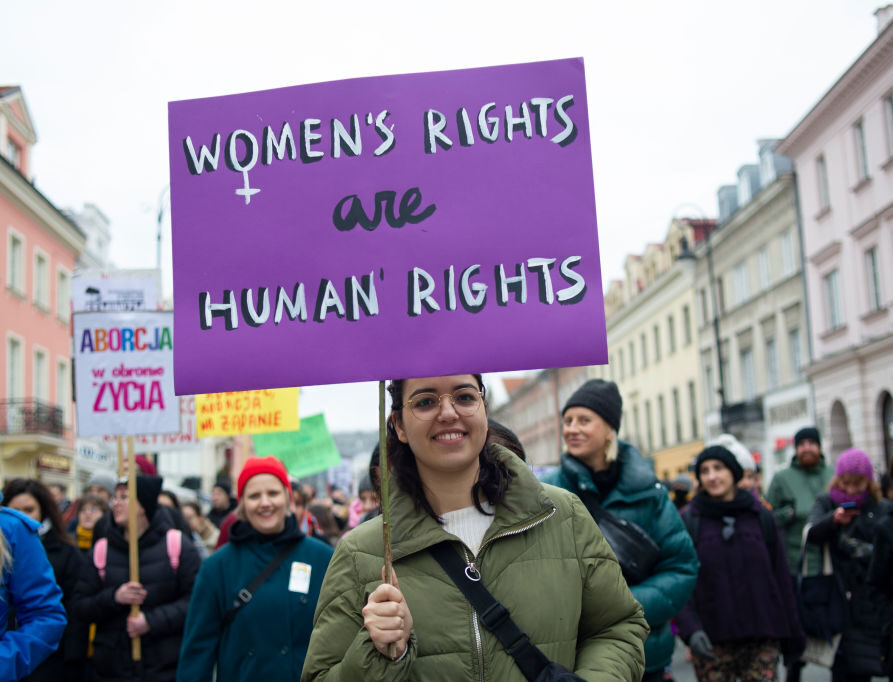What is the problem?
Violence and discrimination against women are global.
Women and girls around the world experience violence and discrimination throughout their lifetimes.
Some girls are denied adequate nutrition, medical care, and access to education from the time they are born. As they grow older, they may be subjected to harmful traditional practices, such as genital mutilation or cutting. Many experience early or forced marriage to partners they did not choose and are unable to decide when and how many children to have. Their freedom to engage in a career of their own choice or travel freely outside their homes may be restricted.
Discrimination against women occurs in every facet of their lives. Around the world, women are paid less at work than men in their societies. Women do not enjoy equal rights and protection under the legal systems in many countries, and they are not represented proportionally in most governments.
In areas of armed conflict, women are disproportionately affected by rape as a weapon of war. When women become widows, whether through armed conflict, disasters or natural causes, they risk becoming heads of households without homes, land, livelihoods or social status to support themselves and their families.
Violence and discrimination affect women everywhere, but intersectional factors, such as educational or economic status, race, caste, ethnic origin, sexual identity, age and abilities exacerbate the challenges many women face.
Why is it an issue?
Violence and discrimination prevent women from enjoying human rights.
Violence and discrimination against women and girls stem from social norms that value them less than men and boys. Families and societies invest in those most likely to maintain and enhance their wealth, power and status. In social systems where authority, privilege and control of property reside in men and boys, resources, such as nutritious food, medical care and school fees, are directed to them from an early age, marginalizing those who are less valued, including women and girls.
When women are not fully valued as equal and contributing members of their families and societies, social norms allow them to be controlled by those who hold authority. Girls can be expected to help with household chores while their brothers go to school. They may be unable to leave their homes or travel without permission, or even supervision, of a male relative. Lifelong decisions, such as whether, when and whom to marry, may be made for them without their consent. Once married, women are often expected to obey their husbands or senior family members and punished if they refuse. In countries around the world, many women are not allowed the right to make their own decisions about whether, when and with whom to have children. The lack of personal autonomy erodes the dignity and independence of women and girls.
Discriminatory legal systems also contribute to unfair treatment of women. Laws in some countries do not consider women equal with men in the right to inherit wealth or property. Women are not allowed to divorce as easily as men in some societies, and they may not have equal rights to their children when a marriage ends. Some laws prohibit women from passing on their citizenship to their children or foreign-born husbands, since women are considered under the control and protection of their husbands or fathers.
Violence against women persists globally with impunity. Although rape and other forms of gender-based violence during armed conflict are prohibited by international law, very seldom, if ever, is anyone held responsible. The incidence of femicide, the killing of women because they are women, is rising globally, but very few of these crimes are investigated or prosecuted. The most common form of violence against women is domestic violence. However, violence in the home is too often considered a “family matter”, and police personnel decline to become involved. In a number of countries and cultures, beating of a wife by her husband is not even written into the law, and is therefore not treated as a crime.
Women almost everywhere are paid less for their work than male employees. Access to housing, property and good jobs is generally challenging for women. Poverty and poor access to good nutrition and medical care result in unacceptable and unnecessary levels of maternal mortality. Disproportionately low representation of women in government and decision-making prevent adequate progress toward the creation of more equal and just societies.
Until women are valued as equal and fully adult, contributing members of their families and societies, they will not be able to enjoy the full spectrum of their human rights.
What is the solution?
Recognize and defend women’s rights as human rights.
We are committed to a world where everyone can enjoy the full range of their human rights. We can help make that a reality for women by standing in solidarity with them and demand that governments:
- Take effective measures to protect women against violence, support survivors of gender-based violence and address impunity for related crimes
- Review and revise laws that discriminate against women
- Ensure that legislation in all countries defines rape and domestic violence as crimes
- End impunity for femicide and gender-based violence
- Decriminalize abortion and recognize abortion as part of normal healthcare
- Protect women’s human rights defenders
- Provide human rights education about the human rights of women
Resources
- Afghanistan: ‘The Taliban’s war on women: The crime against humanity of gender persecution in Afghanistan’
- Afghanistan: Death in slow motion: Women and girls under Taliban rule
- Ethiopia: “I don’t know if they realized I was a person”
- Ukraine: Women face grave risks as Russia’s full-scale invasion enters its second year
Learn more
Report

